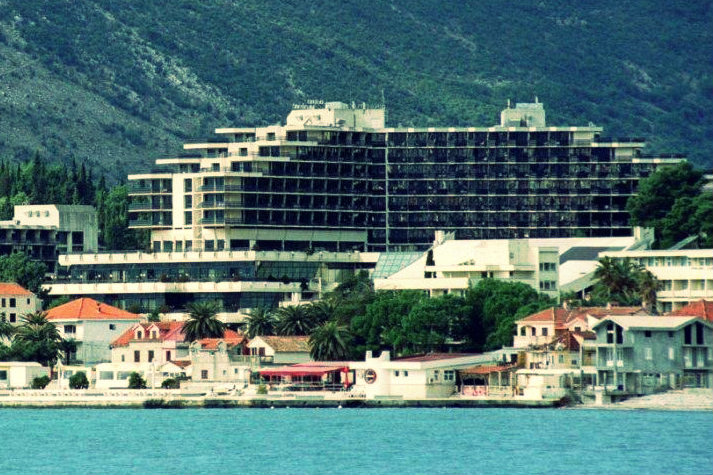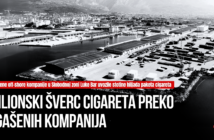 The draft agreement on selling the state’s shares of „Simo Milošević“ Institute is contrary to the public interest and represents a typical act of corruption. Due to personal interests of the alleged strategic investors, this will be an introduction into the devastation of another respectable Montenegrin company, which will further lead to significant job cuts, shows the analysis done by MANS Investigation Center.
The draft agreement on selling the state’s shares of „Simo Milošević“ Institute is contrary to the public interest and represents a typical act of corruption. Due to personal interests of the alleged strategic investors, this will be an introduction into the devastation of another respectable Montenegrin company, which will further lead to significant job cuts, shows the analysis done by MANS Investigation Center.
Late in August, the government accepted the draft agreement for selling 56,4% of the state’s equity of the company from Herceg Novi, thus giving the Privatization and Capital Investment Council the green light to finalize the agreement with the British International Wellness Group (IWG), which was the only bidder.
The government is selling its majority ownership in the Institute, which covers 230 thousand square meters of land and 86 thousand square meters of facilities, for €10 million, whereas the real value of the company’s real estate is estimated to nearly €200 million.
Judging by the buy-sell draft agreement, selling the Institute will mean tearing into pieces the state property, which will be of no use to the employees. On the other hand, the only beneficiary, with the enormous profit, will be the investor, who will be allowed to build apartments for the market, instead of being obliged by the government to substantially invest into health tourism.
Thus the minimum investment program envisaged is €50 million, and the investor will have to carry it out within the five-year period. Only €10 million of the sum should be invested into medical equipment, while the rest would be dedicated to the development of tourism carrying capacities. Having this in mind, it is beyond comprehension why the government approved of the clause stating that the investments could be made from the company’s property.
Considering the valuable property which is being sold for an incredibly small amount of money, the buyer, with the government’s consent, will be able to sell any of the facilities or parcels. This way the investor will not only cover the „investments“, as set out in the agreement, but also make significant profits. Knowing that luxury residences and villas of a couple of hundred square meters are being sold for a million or two, it is evident what damage the Institute’s employees and the state budget will sustain if the agreement is signed.
The agreement can only be terminated in case the buyer invests less than 70% of the projected sum, but not in case it invests €10 million in the medical equipment and concurrently achieves the five star rating for „Vila Galeb“ and four-star rating for other facilities.
This means that the real investment could be significantly lower than the agreed €50 million, whereas it is incredible that the government agreed, in case of termination, to fully compensate the buyer for all the investments made before the termination. In case the government is not in position to make the compensation, the buyer is entitled to record the mortgage against the company’s property twice the sum of the aforementioned compensation. In practice, this means that the buyer can get a bigger payoff in case it does not fulfill the agreement completely, provokes the termination and gets the double of the invested.
The agreement enables the buyer to invest additional €127 million into residential facilities within the five-year period. It will, however, depend on the state location study, which would define construction of new facilities. This is another deliberate mistake with regard to selling the land as a valuable state property – first, the government sells the land, and afterwards they make the plan, which, as a rule, increases building capacity, as well as the value of the land sold.
The difference between the value of the land sold and the value of the land with the appropriate plan represents the direct loss to the state budget. The relevant prosecutor’s office should investigate which percentage of the loss is used to grease palms of those who made such decisions.
Moreover, the buyer is given an option to pledge its share in the Institute after fulfilling the first investment cycle, thus being able to provide a loan to finance the whole project. We witnessed the same scenario with KAP (Aluminum Plant Podgorica) – Uniprom bought KAP through a loan provided by pledging KAP’s property.
Analysis of MANS Investigation Center reveals that the agreement has a number of illegal solutions, the most problematic of which is the clause stating that the buyer is entitled to record the property right after paying the agreed price, despite the fact that, according to law, it is legally impossible. Namely, the government cited the Law on Property-Legal Relations and defined that the payment would be considered as the compensation paid through the privatization, completely neglecting the fact that some of the Institute’s parcels are within the coastal zone and recorded as forest land, meaning that an alien may not acquire a property on them.
Also, the government signed the pledge to compensate the buyer for all the expenses arising from disputes that previous owners had had on the basis of restitution and expropriation, while guaranteeing that none of the clauses was contrary to the applicable law, which was not the case. As an example, the agreement defines that its legality shall not be challenged if any of its clauses is illegal. Also, amendment of legal acts is defined as force majeure, which is an absurd. We saw such clauses in 2005, when KAP was sold for the first time – Russian oligarch Oleg Deripaska was also guaranteed that law amendments would not challenge the agreement he had with the government.
Finally, the government allowed the buyer to transfer the agreement to a third party, with the government’s acquiescence, while any dispute that may arise will be governed by the arbitration in Paris, in accordance with the Rules of Arbitration of the International Chamber of Commerce.
All the aforementioned elements of the agreement point at the flaw of the agreed solutions and also at the fact that a huge corruption affair conducted by the government is taking place. Many individuals close to the government will make a nice profit, while the future of the Institute’s employees is totally uncertain.
Due to a number of flaws contained in the Draft agreement on selling the state’s shares of „Simo Milošević“ Institute, MANS filed an initiative to the Protector of Property and Legal interests to become involved into the whole process, in order to prevent its consequences to the interest of the employees and the general public.
No guarantee for the employees
The social program agreed on by the parties does not guarantee new employment nor the increase of salaries. It is defined that the buyers will comply with the collective agreement for three years. However, it is stated that due to the reorganization of the Institute the number of employees might be reduced.
What is unbelievable is that government guarantees with a single clause that the company has complied with provisions of the obsolete 1999 Law on Social Reform and Pensions.
Also, the agreement guarantees that the buyer will sign an agreement with the Health Insurance Fund, which will secure the minimum of 100,000 stays a year of health insurance beneficiaries. At the end of 2013, the Fund beneficiaries had the total 83,388 stays with the Institute, so it is not clear why the government commits to providing a larger number of stays than it is reasonable.
This text is created with the support of the European Union within the project “Zero Tolerance to Corruption”. Network for Affirmation of Non-Governmental Sector – MANS is solely responsible for the contents of this article, and the views taken herein shall not in any case be considered as those of the European Union.



